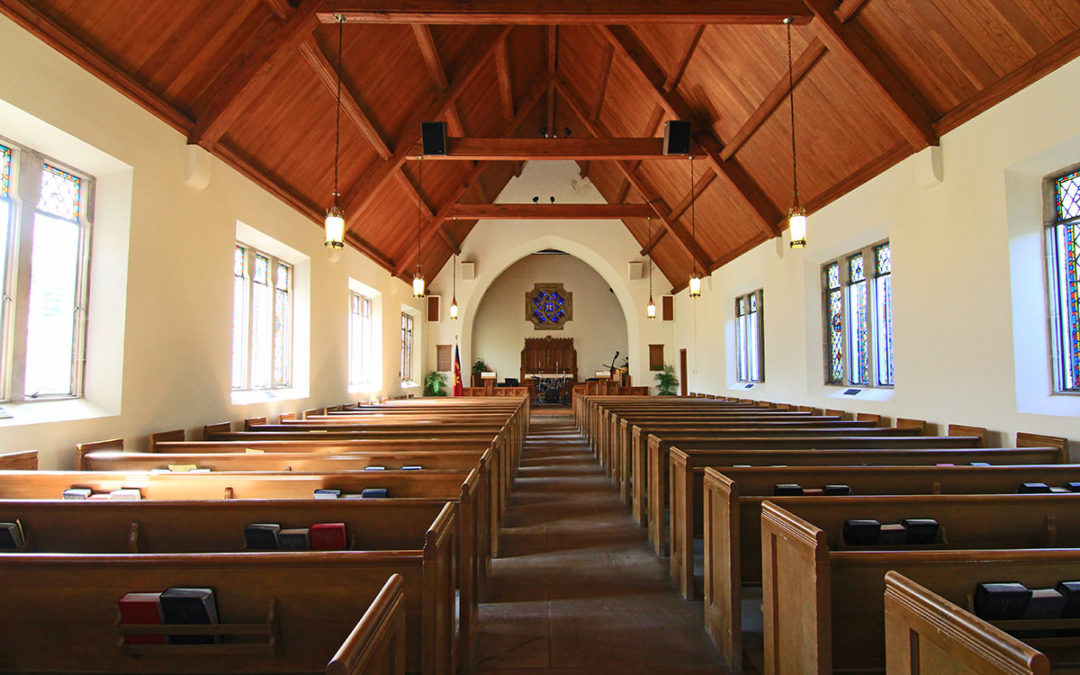
Oct 29, 2018 |
I’ve read statistics about the decline of the church in America. If we are serious about addressing this problem we might first consider our basic purpose—not just to produce programs on Sundays, but to be salt and light.
Jesus said, “You are the salt of the earth. But if the salt loses its saltiness, how can it be made salty again? It is no longer good for anything, except to be thrown out and trampled underfoot. You are the light of the world. A town built on a hill cannot be hidden. Neither do people light a lamp and put it under a bowl. Instead they put it on its stand, and it gives light to everyone in the house. In the same way, let your light shine before others, that they may see your good deeds and glorify your Father in heaven.” (Matthew 5:13-16 NIV)
We must ask ourselves whether the twenty-first century church is as successful a witness to the world as the first-century church. How did the early followers of Christ become salt and light? Did they build great Coliseums and hire celebrated performers, to entertain the Romans into Christianity? Clearly not.
Yet that’s often our mindset today. We understand our roles as performers and spectators at Sunday worship services. And if we’re really religious we invite others to attend the events with us. We have vied against the world, using the ways of the world, and then wondered why in the world our Christian influence has waned.
Many have suggested remedies for our ineffectiveness. Some of these have proven useful, at least for a while. But I suggest that, when it comes to increasing our impact, the key will not come from changing what we do or how we do it.
Instead, the solution will come from a change in how we see ourselves. It demands leaving behind the notion that Christianity is primarily a “Jesus and me” relationship. We must adopt a body-centered view of ourselves; we are members of a worldwide spiritual organism.
This requires a paradigm shift, shedding the traditional idea of the church as a human-created organization blessed by God. We must understand we are to be a living entity, composed of individual believers. Instead of seeing church as a Christian building where we do Christian things, we must recognize that—no matter where we live, work, or travel—we are the body of Christ.
As a doctor, I’m a problem-solver. I tend to approach problems in terms of diagnosis and treatment. So as a Christian I find myself undertaking to diagnose problems within the church so it can enjoy good health.
Over the years, many treatments have been tried to help the church become more effective: programs for church growth, staff development, and evangelism training, to name a few.
The problem is that these programs assume the church is an organization, and can be managed as a business. So unfortunately, we are trying to win the world by using best business practices, rather than understanding we are members of an organic living body.
God has a plan for the long-term health and well-being of the church. It doesn’t rely on human wisdom. It is simply “being the body of Christ”. Jesus said, “By this everyone will know that you are my disciples, if you love one another.” (John 13:35 NIV) The essence of the body of Christ arises from our relationships with each other, not from our abilities or performances.
The most urgent need facing the church is not a requirement to change what we do so much as it is a need to know who we are. Otherwise, we are focusing on short-term problems akin to relieving the pain a cancer patient feels without healing the underlying disease.
In the end it is God, and not us, who has the power to make the body of Christ successful. The body of Christ does not depend on the number of people involved, or on our performances; it depends on the Spirit of God.

Oct 21, 2018 |
Church splits. No matter where you live, you have likely heard about them, or even been part of one. Too often, people who supposedly love everyone—including their enemies—display little evidence of compassion.
However, church splits aren’t the problem. They simply provide evidence of a deeper-rooted crisis: a failure to love the body of Christ.
I don’t mean an intra-church squabble over the color of the carpet or what paint to use for the kitchen, I’m talking about brickbats thrown between different factions within a denomination, or at members of other denominations or backgrounds.
Noted pastor and author Rick Warren addressed this once on his Facebook page, saying that too many Christians use the church, but they don’t love it. That is something he says is hard for many of us to hear
“We’ve been deeply hurt by members of the church . . .” Warren wrote. “But the Church is the bride of Christ. It’s the hope of the world, the vessel through which God works out his plan. We have to learn to love the Church. . . . Jesus loves his Church. If for no other reason than that—we must love the Church also.”
I wholeheartedly echo Warren’s sentiment. It reflects a truth that God wants us to understand about the spiritual world: the body of Christ is real, not a metaphor for some mystical, ethereal group.
It is a living spiritual entity as real as the chair you are sitting on, the treadmill you are traversing, or the stationery bicycle you are riding as you read these words. God created this body, just as He created all other living things.
The body of Christ is not just a “good idea,” or a “good option.” It is the only option, the plan God created to fulfill His will on earth.
When Jesus asked His disciples what others were saying about him, the guesses ranged from John the Baptist to Elijah or Jeremiah.
Christ wanted to know, though, what they thought. When Peter answered that He was the Messiah, the Son of the living God, Jesus replied, “Blessed are you, Simon son of Jonah, for this was not revealed to you by flesh and blood, but by my Father in heaven. And I tell you that you are Peter, and on this rock I will build my church, and the gates of Hades (meaning hell) will not overcome it” (Matthew 16:17-18).
The church is God’s secret weapon in the eternal battle between good and evil. This spiritual war has raged in the heavens throughout eternity, from before the creation of our planet.
We not only must love the church; we must be the church. Sadly, the personality and traits of our culture are too often reflected in the local church.
We live in a society that emphasizes the superficial. What amazes me is how, instead of rejecting the idea that appearance is the leading measure of value, church members too often reflect this pattern.
I know of an evangelist who marvels at how many “beautiful couples” from Bible college are divorced because they chose a spouse based on appearance. Over the years, I have met numerous church members who selected a marital partner according to superficial qualities, and then wondered why they saw their marriage dissolve.
These breakdowns are only one reflection of how the modern church too often concerns itself with the artificial. We have dazzling experiences and major events that draw a crowd, without stopping to consider whether we are making a lasting impact.
My vision for the body of Christ is for it to be an effective influence on society. While churches are sometimes dysfunctional and ineffective organizations, this does not need to be a permanent condition. It will change as we line up with God’s vision for us as one body, one faith, and one Church.

Oct 14, 2018 |
Influential Swiss psychiatrist Carl G. Jung once said: “Man, as we realize if we reflect for a moment, never perceives anything fully or comprehends anything completely.” That thought mirrors what Paul wrote in 1 Corinthians 13:12 about our earthly perceptions: “For now we see only a reflection as in a mirror” (NIV).
The way people use language provides insights into their thought processes. The Hebrews thought of “body” in a different way than we do today. We emphasize the autonomy of the individual; they saw themselves as a collective “flesh.”
The question Westerners must ask ourselves is whether we can understand the meaning of the body of Christ, or if our world-view becomes too individualistic and self-centered?
Over time, we have progressed from not considering the individual body to almost worshipping it. This is probably the main obstacle to an accurate understanding of the body of Christ. Believers are tainted by the spirit of a narcissistic age.
We use verbal symbols, or words, to communicate our ideas with others. But when we do, there is always a slight difference in meaning between what the speaker intends to communicate and what the hearer understands.
This isn’t just because people don’t listen. Differences in background, education, and life experiences can put a different interpretation on the same words.
In addition, different people have slightly differing definitions of the same word. Thus, another person usually gets the gist of what we’re saying, but as Jung observed, we never achieve a 100 percent correlation.
For practical, everyday interactions, what people lose in the process is not a major problem. However, when we need to communicate in precise terminology, this can pose significant problems.
These problems are rooted in the way we use symbols. Symbols are like containers (I picture them as containers or bowls) holding meanings. They have power to shape how we understand ourselves and our world. When we possess symbols that are true to God’s plan for us, we can enjoy their richness as we fulfill His purpose for our lives. For example, we can endure incredible hardship if we grasp its deeper meaning.
Understanding the broader meaning of one’s life and existence lifts us above an existence based primarily on consuming products and services. The broader meaning of life is comprehending what people in everyday life are lacking, and what the body of Christ has to offer them.
Thus, “body of Christ” is not symbolic or metaphorical, but rather literal. We are not like the body of Christ; we are the body of Christ. The concept is not one of multiple personalities in community, but of a single organism with a single personality.
In his letter to the Romans, Paul wrote that “in Christ we, though many, form one body, and each member belongs to all the others” (Romans 12:5).
At the time, any other writer might have written that “we, though many, are one body.” That would have emphasized the unity of the believers. But Paul added the crucial phrase, “in Christ,” which helps us know that we are to be more than just unified in the same way our favorite football team, sorority, or fraternal organization comes together to achieve a particular goal.
We are one. We are Christ’s body, meant to operate in unity and for His glory.

Oct 8, 2018 |
In Romans 12 and other places, Paul taught that when we become believers we are to see ourselves primarily as the body of Christ, and only in a secondary way as individual members.
The ancient Greek philosopher, Aristotle, is credited with originating the familiar phrase passed on by numerous observers ever since: “The whole is greater than the sum of the parts.”
Truer words were never spoken. The whole body of Christ is greater than the sum of the individual members, because the Spirit of Christ arises in our midst. It is the interactions between the members that give the body its character, not its individual members. Otherwise, the church is just a gathering of individuals with common interests.
How did Paul get such a novel idea, to equate Christians with Jesus Christ? Maybe part of the answer comes from his encounter with Christ on the road to Damascus. When a light from heaven flashed around him and Paul fell to the ground, Jesus asked (to paraphrase), “Why are you persecuting Me?”
Notice Jesus didn’t ask, “Why are you persecuting My people?” Paul’s initial, life-changing encounter with Christ cemented this connection forever in his mind. It prompted him to write the words that appear in 1 Corinthians 12:12: “Just as a body, though one, has many parts, but all its many parts form one body, so it is with Christ.”
The ending to that sentence is a key to understanding the importance of the body. Paul didn’t end with the words, “so it is with the church.” Instead, he wrote “so it is with Christ.” This shows how deeply Paul felt we are one with Christ, not simply a group of individuals with a common interest.
It is vital to keep this distinction from growing muddled in our minds and hearts. The body of Christ is clearly defined in the Bible. The body is composed of individual believers with Christ as the head, nothing more.
So although local churches, ministry organizations, denominations, Christian music, Christian literature, and Christian schools do good things and serve worthwhile purposes, they are not members of the body.
Although useful for assisting us in accomplishing God’s plans, neither Christian organizations nor church institutions are part of the body; it consists of individual believers.
Jesus not only created and founded the church, He is still present in the church, giving it life. When we are healthy members of the body of Christ we can participate in the same life and power that motivated our Savior when He walked on this earth. Jesus makes Himself known more fully to us as a body than to us as individuals.
Only a living spiritual organism can fulfill the plan of God for the world; many religious organizations have tried and failed. The first step to succeeding in fulfilling Christ’s Great Commission is to see ourselves as the body of Christ.

Oct 1, 2018 |
In his short but profound 1970 book, The Mark of the Christian, noted apologist Francis Schaeffer observed that love toward all Christians is the identifying mark of Christ’s followers.
It is a way to discern whether something profound has occurred to a person in the spiritual realm and that they indeed have been transformed. They don’t just say they’re a Christian, they act like one.
In His legendary Sermon on the Mount, Jesus said, “Watch out for false prophets. They come to you in sheep’s clothing, but inwardly they are ferocious wolves. By their fruit you will recognize them” (Matthew 7:15-16 NIV, emphasis added).
In the same way, we can recognize whether people are following God, we can see what I call the “fingerprint of God” on all living creatures and plants—the identifying marks that are readily detectable after God has given them life.
I am particularly interested in God’s fingerprint on the Church (the worldwide body of Christ). In terms of a living body, it is fascinating to note the New Testament writers often refer to the Church in biological terms.
For instance, Paul coined “body of Christ” to describe believers collectively. We are a living, breathing, functioning body, not a social organization or a business trying to maximize soul-winning effectiveness.
Before we can examine God’s fingerprint on the Church, we must define the term, since there are several entities that use church.
Among other things, “church” can refer to a building used for worship, a religious service in that building, the people who meet in that building, all Christians worldwide, a denomination, or the clergy in general.
This plurality of meanings can be confusing for believers and nonbelievers.
I see a distinction between “church” defined as the body of Christ and “church” defined as organized Christianity. I see the body of Christ as a living spiritual entity created by God. Because of that, it has characteristics of life—the fingerprint of God.
On the other hand, organized Christianity is created by people to serve as a tool for the body of Christ. This is not to say organized Christianity is bad, but it is not inherently good either. In reality, it is neutral. A tool used by people. How the users subsequently wield it determines its essential nature.
Schaeffer concluded The Mark of the Christian by quoting the poem, Lament, by prolific Irish poet Evangeline Paterson. I especially like the opening and closing lines:
“Weep, weep for those
Who do the work of the Lord
With a high look
And a proud heart . . .
Weep, weep for those
Who have made a desert
In the name of the Lord.”
The poem serves as a warning to those who build plans and programs in God’s name, but don’t treat others as brothers and sisters in the body of Christ. They may do mighty works, but in the process they quench weaker believers instead of building them up in Christian love.
To survive the calamitous times that undoubtedly lie ahead for believers, we must move together in love. We are the body of Christ.





